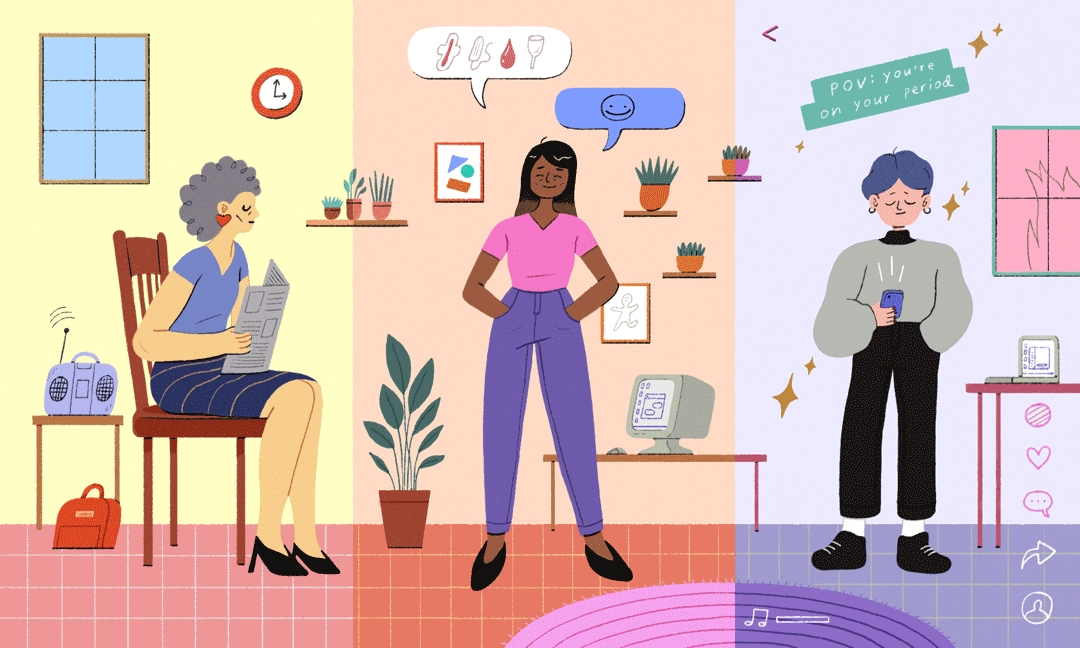
The Evolution of Menstruation
Share
 Every generation has its collections, pop-culture, style choices, and even how they talk about certain subjects. Though we’ve all grown up in different times, if you’re someone who menstruates, we’ve all had the same universal experience. And although we share that universal experience, that doesn’t mean we interacted with it the same way.
Every generation has its collections, pop-culture, style choices, and even how they talk about certain subjects. Though we’ve all grown up in different times, if you’re someone who menstruates, we’ve all had the same universal experience. And although we share that universal experience, that doesn’t mean we interacted with it the same way.
Period culture and talking about menstruation has changed immensely over time. So what was it like for each generation to experience menstruation in their individual social climate, and how does that change how we talk about periods culturally?
Generation X
Gen X covers the people who were born between the middle of the 60s to about 1981. This timeframe includes the individuals who essentially grew up without the internet as the cornerstone of pop culture. Television and magazines were the big frontrunners for culture and information, and the social climate was still evolving from the rigidity of the past.
Menstruation wasn’t widely discussed as it was still considered a “taboo” subject and was primarily thought of as gross or private. Menstruation was still considered a solely cisgender female thing, and there wasn’t discussion around those who were unable to reproduce or who didn’t identify as female. Periods weren’t even mentioned in pop culture until the seventies, and even then, it was limited.
Sanitary pads with adhesive became popular in the 70s, and the less helpful products were phased out. The majority of tampon and pad advertisements didn’t feature the products themselves, and the word “period” wasn’t mentioned in television ads until Courtney Cox’s Tampax commercial in 1985.
Periods were usually discussed with doctors or female family members for most of Gen X’s lives. So it makes sense that it would still be something that this generation doesn’t speak as openly about as others. It has only recently become socially acceptable to discuss menstruation openly in the media and among peers.
Millennials
This generation covers individuals born between 1981 and the mid to late 90s. Pop culture changed drastically during this time. For millennials, the early days of the internet influenced social and popular culture. Media started to change how information spread and how things were discussed in households and among peers.
Tampons became increasingly popular as they targeted “women on the go.” They were easy to transport, and it was purported that you could use them while at work, school, and while playing sports. They became more functional and less clunky and uncomfortable so that you could wear them anytime.
Period commercials became more popular after 1985. Those commercials, as well as print ads, made the topic easier to discuss. These ads were placed between primetime shows and videos. They made period culture more accessible and less taboo, and parents found new and creative ways to discuss menstruation with their children.
This era also saw the beginning of the slow progression towards inclusivity. Many millennials have pushed themselves into activism and bringing period culture into the modern age. Even though some millennials still find it uncomfortable to discuss, the majority find it easier to talk about compared to former generations.
Generation Z
This generation covers those born anywhere from the mid-to-late 90s to the early 2010s. Gen Z has been at the forefront of the technological age as the internet, and social media have become pop culture kings. They have seen the most advancements in period technology and period culture/activism.
Movies like 8th Grade and teen drama shows have made the subject less uncomfortable by normalizing menstruation and showcasing that it isn’t scary or taboo. There has been a massive leap in progress as far as opening up communication about menstruation and inclusivity. Trans and nonbinary folks who menstruate are included in the conversation, and there are active strides towards equity.
Periods are now actively discussed on social media and pop culture apps like TikTok. This generation has seen the gap close when it comes to normalizing period culture and discussing it openly, rather than it being something gross or limited to one group of people.
We have seen strides in the individuals from all three generations in regards to period culture today. These changes are only continuing to normalize periods rather than demonize them. We will continue to break down harmful myths and stereotypes along the way.
